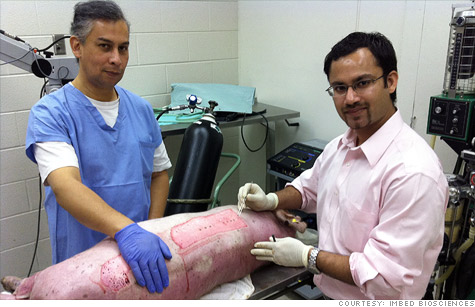Search News

Immigrants file 76% of patents at the top 10 patent-producing colleges. But many like Ankit Agarwal, CEO of Imbed Biosciences, run into legal trouble when trying to launch their own businesses.
NEW YORK (CNNMoney) -- A new study shows immigrants file 76% of patents at the nation's top schools. Now, the question is how to keep those bright minds in the country.
The study, released Tuesday, is the second produced by a pro-immigration reform group that claims the United States is falling behind in the race for talent. The Partnership for a New American Economy took a look at the inventors behind patents at the 10 universities producing the most patents in 2011.
That year, 54% of those patents came from students, postdoctoral fellows or staff researchers. That's an issue, because the United States is losing ground against other nations by pushing out immigrant graduates seeking to launch their own businesses.
Few options exist for those who want to stay in the country legally, and the most common route -- finding another company to sponsor your visa -- goes against the entrepreneur's mission.
Take the case of Ankit Agarwal. Born and raised in India, he traveled here to earn a Ph.D. in chemical engineering at Iowa State University. He then headed north to conduct research at the University of Wisconsin, where he and a colleague created an artificial skin resistant to infections.
Seeing a major business opportunity, he sought to start his own company and raise money for research. That's when his troubles began.
Agarwal didn't have many options. He couldn't raise capital without a visa. The university wouldn't sponsor his visa because he was a staff researcher and it reserved sponsorships for professors only, he said. Getting sponsored by another company also wasn't a good idea, because it would leave him little time to launch his own company.
"If we would have waited, we would have lost the market opportunity to start this company," Agarwal said.
Immigration attorneys told him he couldn't get around that by starting his own corporation and sponsoring himself. The other likely option, they said, would be to head back to India and get in line, a process that would take several years.
Instead, he found a lawyer that helped him sponsor himself with a special exception reserved for notable personas with international acclaim, such as Nobel Prize winners. He got federal approval in two days, ending the two-year ordeal. But that was a long shot, and it's a not viable option for most.
Agarwal, now 32, said it was a lengthy process two dozen Indian college friends -- all scientists and engineers -- weren't willing to undergo after studying here.
They had trouble finding work here during the Great Recession, so they couldn't get a visa. Instead, they returned to India, and the United States lost capable scientists it educated.
"If we cannot recruit the best talent in the world, then this whole image of America -- that the best people come over here -- seems to be false," Agarwal said.
And it's why he fought so hard to stay.
"I feel it's an obligation," he said. "It was my dream when I came here: Get a first-class education, work with the best talent, and work where people are encouraged to do new things."
On Tuesday, Agarwal took part in the pro-immigration group's announcement of the study as an example of the kinds of talent the country so easily lets go. The study was a follow-up to another recent report, which showed that from 2001 to 2011, the share of employment or skill-based visas fell from 17 percent to 13 percent, losing out to student, medical or other types of visas.
John Feinblatt, chief policy advisor to New York City Mayor Michael R. Bloomberg, one of the group's co-chairs, explained why the most recent findings matter.
""Immigrant inventors create patents and patents create jobs. It's as simple as that," Feinblatt said. "We can't afford to send them away, and need Washington to act now." ![]()